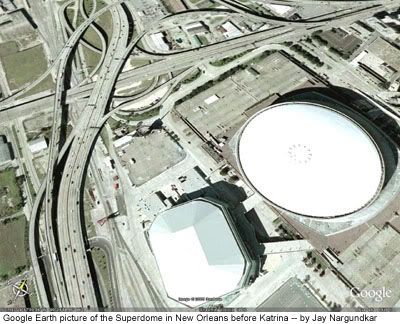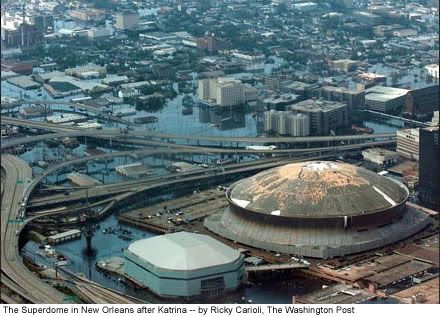

Hell hath no fury like Hurricane Katrina. A major metropolitan city, New Orleans, has been all but destroyed. The entire Gulf Coast looks like an A-bomb hit. When I see the pictures of dead bodies floating in the water, thousands of refugees stranded for days on end, and looting in the streets, I am beyond words--this is happening in America? So many thoughts go racing through my head.
I'm struck by the similarities and differences between this tragedy and the Indian Ocean Tsunami of December 2004, the international mega-disaster that claimed 200,000 lives. In the aftermath of the tsunami, I was honestly touched by the number of people who opened up their hearts and wallets because they cared about the plight of Third World villagers half way around the world. The day after New Year's, several friends and I stood outside local Giant grocery stores and collected nearly $2500 in donations. The main theme to arise immediately after the tsunami was that sense of collective generosity, action, and optimism.
Those same themes are certainly manifest in the nation's response to this latest tragedy, but Katrina, having struck here at home, has also hit a lot of raw nerves. Certainly, in the first days after this hurricane, anger more than anything else dominated the discussion. Why weren't preventive measures taken to guard against this disaster? What does it say about race and class problems in America that the vast majority of victims--the ones who were unable to evacuate beforehand--were black and poor? Why was the relief effort so slow and badly uncoordinated?
I'm oft critical of the media when they spend too much time on frivolous matters instead of doing their job, but in the past week I have to say that the news organizations really stepped up to the plate. The broadcast channels and newspapers all did an exemplary job at getting to the area and getting a very human and tragic story out to the American public. Indeed, the coverage was so personal and compelling that I couldn't help but notice the barely disguised anger in reports from Brian Williams, Anderson Cooper, and others. They were each wondering what the public has been asking for days: how is it that the news crews could get in but the relief crews were nowhere in sight?
Federal officials maintain that they were unaware of the severity of the disaster for a few days after Katrina hit. Unbelievable! Thankfully the press has been alert and unrelenting in its coverage of the relief effort. On his Friday night show, Bill Maher cheered that, at last, a press that had been enfeebled since 9/11 and the Iraq war seemed to have rediscovered the ability to ask tough questions and challenge the administration. Well, that's a lone spot of bright news.
There's not really anything to cheer about after Katrina. Preliminary estimates put the death toll at a staggering 10,000, or more than 3 times the casualties of the 9/11 attacks. Katrina is also estimated to have cost $100 billion in damages. The numbers are just a guess, but by any standard it is mindblowing to witness such utter destruction and chaos here in America. I am just thankful that I, unlike many people around the country, did not lose anyone in this tragedy. A friend of mine, though, is a sophomore at Tulane University in Louisiana. His school has been shut down for the semester and he has temporarily transfered here to College Park.
Most of Katrina's victims will not be able to pack up, relocate, and start anew. In the opening scene of Shakespeare's The Tempest, Gonzalo cries "Now would I give a thousand furlongs of sea for an acre of barren ground." It is a sentiment likely shared by thousands whose lives have been irrevocably altered. Friday, President Bush vowed that "New Orleans will rise again and be a greater city of New Orleans." It may take months for the city and the rest of that storm-ravaged area to recover, but I certainly hope Bush's promise comes true. America has responded to tragedy heroically in the past. Let's do so again.
Note: This post was adapted for a column in the September 7 issue of the Maryland Diamondback, also titled "Katrina's Deep Impact".
2 comments:
What do you think of the idea that New Orleans should not be rebuilt on the below-sea-level site at all? It's been running through the Tribune a little.
Well, you may have heard how House Speaker Denny Hastert got in trouble for saying that it didn't make sense to spend billions of dollars to rebuild a city that's seven feet under sea level. ("It looks like a lot of that place could be bulldozed" is the runaway winner for the No Sensitivity Award!)
As far as I'm concerned, I'm certainly not qualified to judge the feasibility of such a project and whether it will be safe from another once-in-a-lifetime disaster. That said, I think that New Orleans should be rebuilt where it was. We just need to take better engineering precautions this time around--look at how they do it in the Netherlands or Denmark. In those countries, they have reclaimed huge portions of land that are below sea level through the use of dikes and what not. I don't know if that would work here, but it's worth looking into.
Post a Comment